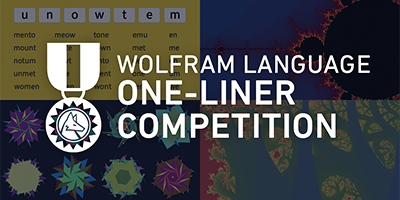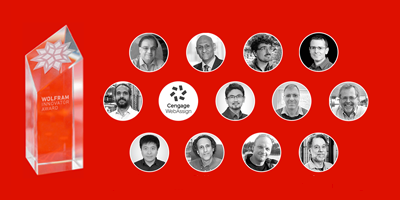Highlights from the 2018 Wolfram Technology Conference

Last week, Wolfram hosted individuals from across the globe at our annual Wolfram Technology Conference. This year we had a packed program of talks, training, and networking and dining events, while attendees got to see firsthand what’s new and what’s coming in the Wolfram tech stack from developers, our power users and Stephen Wolfram himself.

The conference kicked off with Stephen’s keynote speech, which rang in at three and a half hours of live demonstrations of upcoming functions and features in Version 12 of the Wolfram Language. Before getting started, Stephen fired up Version 1 of Mathematica on a Macintosh SE/30—it’s remarkable that running code written in Version 1 still works in the newest versions of the Wolfram Language. Stephen also shared with us the latest developments in Wolfram|Alpha Enterprise, introduced Wolfram|Alpha Notebooks, new cloud functionalities, the Wolfram Notebook Archive and the local Wolfram Engine, a way for developers to easily access the Wolfram Language without barriers of entry.
Version 12 Is Coming

Most exciting during Stephen’s keynote was the litany of new features coming in Version 12 of the Wolfram Language. Stephen ticked through them starting alphabetically—a is for anatomy, b is for blockchain, c is for compiler and so forth. A few of the many highlights included:
- Audio—speech synthesis, speech recognition and audio recognition with built-in superfunctions built on top of pre-trained neural networks, a way to rapidly prototype and speed up development
- Axiom systems—the Wolfram Language has always been the best at highly advanced mathematical functionality, and Stephen introduced a new way to computationally examine and analyze logic axiom systems (including his own discovery of the simplest axiom system), along with automatic theorem proving
- Blockchain—Stephen introduced more functionality for building and executing computational contracts, and shared some recent developments in Wolfram Blockchain Labs; he also talked about how companies using Wolfram|Alpha have the best oracle to verify conditions under which smart contracts are executed (you can watch Stephen explain the future of smart contracts here)
- Compiler—perhaps one of the most anticipated developments in the Wolfram Language, the compiler increases speed and efficiency by orders of magnitude, and will undoubtedly change the way individuals and organizations develop applications with the Wolfram tech stack
- Databases—another development Stephen introduced was increased connectivity to external databases using the Wolfram Language entity framework; Postgres, Oracle, SPARQL, S3, IPFS, a slew of SQL databases and more will now work seamlessly with built-in functions that improve data handling in the Wolfram tech stack
- Externals—we also saw new connectivity with ZeroMQ, connectivity to Jupyter notebooks (for those who choose to use a less sophisticated notebook interface for exploratory work) and new functions for directly executing commands on the web
- Facial features—another set of superfunctions with artificial intelligence built directly into them; age, gender and emotion of facial images can now be determined with the same ease of use as ImageIdentify
- Geocomputation—new functions for geopositions and sophisticated computations with vector operations that build on an already impressive set of functions for geographic visualizations and applications
- Geometry—after 2,000 years, Platonic solids are finally computable in the Wolfram Language, along with new ways to compute with Euclidean geometry, polyhedra and synthetic geometry
- Neural networks—with the launch of our Neural Net Repository, new functionality keeps coming out of R&D and experimentation, such as a more efficient framework, support for multiple GPUs, support for Tensor Core and more
The upcoming release of Version 12 will bring with it not only new functions, but also improvements to interfaces, interoperability with other programming languages and core language efficiencies. If you’re interested in seeing Version 12 being designed and built firsthand, be sure to watch Stephen’s “Live CEOing” series of livestreams.
A New Kind of eSport with Livecoding

For the second year, Wolfram hosted and livestreamed a livecoding championship where our internal experts and conference guests competed to see who had the best Wolfram Language chops. To be hosted annually, the competition is a fun way to unwind after a day full of talks and an evening of networking. Each contestant is given a coding challenge, and the first to accurately solve the problem is awarded points. Challenges utilize the full range of capabilities in the Wolfram Language, including built-in data, geometric computations and even data science. It was impressive to see how quickly a complicated problem could be solved.

This year, our winner was Chip Hurst, a Wolfram expert who is currently involved in cutting-edge developments in 3D printing in biotech applications. Congratulations, Chip!
Wolfram Innovator Award Winners

Each year at the Technology Conference, Wolfram recognizes outstanding individuals whose work exemplifies excellence in their fields. Stephen recognized eight individuals this year, from educators to engineers to computational mathematicians. This year, Wolfram honored:
- Abby Brown, a professor of mathematics at Torrey Pines High School, where she develops innovative ways to get her students interested in STEM through 3D printing, mathematics clubs and lesson plans that incorporate artificial intelligence with Wolfram technologies
- Bruce Colletti, a retired United States Air Force major and defense contractor whose work uses Wolfram technology for high-level commercial, academic and government projects focused on operations, logistics, program evaluation and homeland security
- David Creech, the principal engineer at McDermott, who leads the development of new systems and processes culminating in hundreds of thousands of lines of Wolfram Language code and thousands of pages of documentation
- Nicholas Mecholsky, a research scientist at the Vitreous State Laboratory and adjunct assistant professor at the Catholic University of America whose work uses Mathematica to model large-scale chemical processes that increase the safety of nuclear waste storage
- Jorge Ramirez, an applied mathematician at Universidad Nacional de Colombia Sede Medellín whose work spans natural and biological sciences and includes innovations in education delivery using Mathematica
- Aaron Santos, a data science supervisor at EMC Insurance whose work uses Wolfram technology for rapid prototyping, innovative Internet of Things measurements and multiparadigm data science to develop innovative solutions to complex problems
- Neil Singer, the president of AC Kinetics, Inc., where he uses Wolfram SystemModeler for advanced simulation of digital motor controllers
- Nassim Nicholas Taleb, a distinguished professor of risk engineering at the New York University Tandon School of Engineering and author of the multivolume essay Incerto whose work examines risk, probability and computational preasymptotics (a field that is often ignored)
That’s a Wrap!
We’ll be back with a post about the winners of our annual one-liner competition. This year’s conference was another success for the books, and we look forward to seeing everyone back next year!



Comments